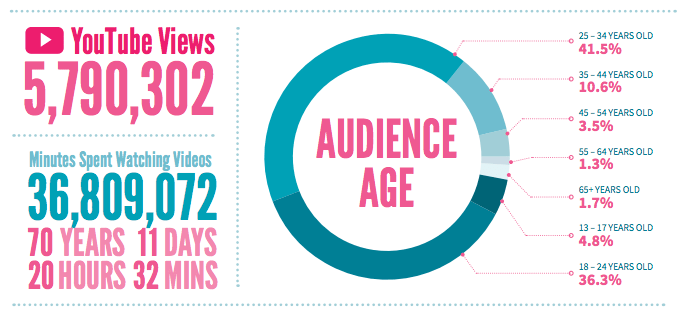Need a breath of hope for the video games industry, particularly the presence of women and women’s voices within it and its community? Well, Feminist Frequency’s 2014 backer report isn’t all sunshine and rainbows… but it’s got a few solid rays.
Feminist Frequency, the brain child of Anita Sarkeesian, has often offered inside information on the Tropes vs. Women in Video Games project, if only for its Kickstarter backers, but now that Feminist Frequency is officially a 501(c)3 nonprofit, the organization has prepared its very first public annual report. In it, as Sarkeesian details the 2014 achievements, both quantitative and qualitative, of Feminist Frequency and Tropes vs. Women in Video Games, she also talks about how online harassment (much of which memorably strayed offline this year) has made itself an inextricable part of the process of creating and releasing Feminist Frequency videos.
While Tropes vs Women in Video Games was originally a project examining women’s representations, the extreme harassment that I experience has become an intrinsic and inseparable part of this project, fundamentally changing my life and the landscape in which I release my videos. Gendered online harassment is not a new phenomenon, but the intensity of cyber mobs, especially in gaming, is increasing in frequency and severity. It became apparent to me that I should speak up and use my experience to help expose the epidemic of online abuse. Nearly half of my time is spent raising awareness on the epidemic of online harassment and working to help change policies on the institutional level. Some of these efforts are done publicly through Feminist Frequency’s website and social media presence, as well as countless media interviews and at public speaking events. But there is also work being done behind the scenes in private meetings and consultations with major social media and gaming platforms, and by partnering with other organizations to form a task force with the goal of ending online harassment.
Feminist Frequency’s announcement that it’s working with organizations to form real solutions and opposition to organized online harassment comes close on the heels of the announcement of Zoë Quinn’s Crash Override, a network which hopes to offer support for victims of concentrated online harassment, one of the few heartening things to come out of Gamergate as a whole.
[Update: We didn’t notice this the first time we went through the FemFreq docs, but 2015 will also see the debut of two brand new video series! One will focus on the depiction of masculinity (Tropes vs. Men in Video Games, anyone?), and another will showcase examples of positive female representation in games.]
The report also details the hard statistics on Feminist Frequency’s online video success, the rising tide of national news coverage (not only by the New York Times, but places like The Colbert Report and Nightline) for Feminist Frequency and the struggles of women in the video games industry and community, and, perhaps most encouragingly, testimonials of its affect on the movers and shakers of the games and tech industries themselves. Feminist Frequency’s PDF version of the report shares this quote from Neil Druckmann, creator of The Last of Us:
Feminist Frequency’s Tropes vs. Women in Video Games series has become essential viewing for developers. The videos have been instrumental in affecting an industrywide discussion about the representation of women in games. The series was influential in putting me on a path to create and write stronger, more complex female characters.
Sarkeesian herself admits that the invitations to give talks, gracious acceptance of criticism, and simple grateful acknowledgements for Feminist Frequency’s role in shaping internal discussions (at EA DICE, Bungie, ArenaNet, and many other game studios big and small) are some of the most ” hopeful signs” she’s received over the past year that the video game industry is becoming a more thoughtful one. While it should not be minimized that a vocal minority in the community is making life, at the least frightening, and at the worst very, very difficult and dangerous for women in games, we’re also seeing changes for the better at every level of the community and the industry.
(FemFreq annual report on Kickstarter, and in PDF)
Are you following The Mary Sue on Twitter, Facebook, Tumblr, Pinterest, & Google +?









Published: Jan 26, 2015 12:08 pm